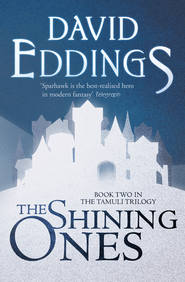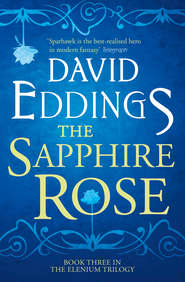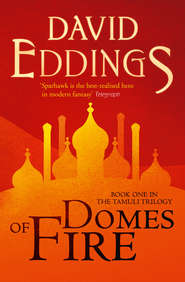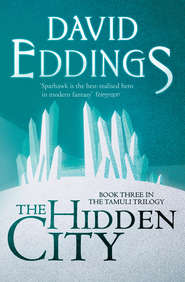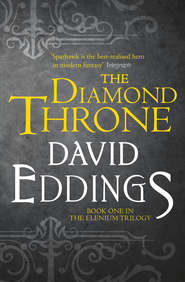По всем вопросам обращайтесь на: info@litportal.ru
(©) 2003-2025.
✖
Polgara the Sorceress
Автор
Год написания книги
2019
Настройки чтения
Размер шрифта
Высота строк
Поля
Got you that time, didn’t I, Old Wolf?
Then King Cherek and his sons, Dras Bull-neck and Algar Fleet-foot, arrived for the wedding, and things began to get just a bit more serious. Despite the way Beldaran and Riva felt about each other, my sister had been right. Theirs was an arranged marriage. The possibility that my father might also decide to arrange one for me – just to protect me from all those fawning suitors – raised its ugly head. There was in those days – probably even still existing – the idea that women are intellectually inferior to men. Men did – and many still do – automatically assume that women are empty-headed ninnies who’ll fall prey to the first glib young man who comes along with certain ideas in his mind. The result, of course, is the virtual imprisonment of almost all women of a certain rank. What my father and all those other primitives can’t seem to realize is that we’ll resent that imprisonment and go to almost any lengths to circumvent it. That might help to explain why so many girls become involved with inappropriate young men. In most cases the character of the young man doesn’t make a jot of difference. The girl in question is driven by a desire to show them that she can do it, rather than by empty-headed lust.
That’s frequently the reason for so many arranged marriages. The father marries his daughter off as soon as possible to ‘protect’ her. After she marries, any dalliances she chooses to take up to amuse herself are her husband’s problem.
The possibility that father might choose to shackle me to either Dras or Algar made me distinctly uneasy for a while.
Chapter 5 (#ulink_0ca125cf-d6c1-5db0-8c83-675262be8ce8)
For some reason, mother had always been a bit vague about father’s now-famous trip to Mallorea, and I felt that I might need some information in order to counter any absurd notions that could come popping into his head. I went looking for uncle Beldin.
I found him high in one of the towers of the citadel. He was nursing a tankard of beer and looking out at the sullen black waves surging under a threatening sky. I broached the subject directly. ‘How much can you tell me about father’s expedition to Mallorea?’ I demanded.
‘Not much,’ he replied. ‘I wasn’t in the Vale when Cherek and the boys came to fetch him.’
‘You do know what happened, though, don’t you?’
‘The twins told me,’ he said, shrugging. ‘As I understand it, Cherek and the boys came slogging through the snow in the dead of winter with some kind of half-wit notion that the priests of Belar had dredged up out of what the Alorns call “the auguries”. Sometimes Chereks can be awfully gullible.’
‘What are auguries?’ I asked him.
‘Supposedly a way to foretell the future. The priests of Belar all get roaring drunk, and then they got a sheep and fondle his entrails. The Alorns have a quaint belief that sheep-guts can tell you what’s going to happen next week. I’d rather strongly suspect that the ale plays a large part in the ceremony. Alorns are enthusiastic about it. I don’t imagine the sheep care much for the idea, though.’
‘Who could possibly be gullible enough to believe something that absurd?’
‘Your incipient brother-in-law, for one.’
‘Oh dear. Poor Beldaran.’
‘Why this sudden interest in quaint Alorn customs, Pol?’ he asked.
‘It occurred to me that father might want to get me out of his hair by marrying me off to Algar or Dras, and I don’t think I’m ready for marriage just yet. I want to come up with some arguments to nip that in the bud.’
He laughed. ‘Not to worry, Pol,’ he told me. ‘Belgarath’s a little strange sometimes, but he’s not that strange. Besides, the Master wouldn’t let him get away with it. I’m fairly sure he has other plans for you.’
As it turned out, that proved to be a gross understatement. Although I was fairly certain that there was no Alorn husband in my immediate future, Dras and Algar hadn’t heard the news as yet, so a pair of Alorn kings joined my crowd of suitors.
Dras was the more aggressive of the two, since he was the eldest. I found his attentions something of a relief. He was direct and honest, unlike the adolescent Rivans with their clumsily contrived conversational ploys. Dras already knew who he was, so he wasn’t inventing it as he went along. ‘Well,’ he said to me a couple of days after he, his father, and his brother had arrived, ‘what do you think? Should I ask my father to speak with yours?’
‘About what, your Majesty?’ I feigned innocence.
‘Our wedding, of course. You and I could get married at the same time your sister and Riva do.’
His approach didn’t leave me much maneuvering room. ‘Isn’t this all coming just a little fast, Dras?’
‘Why waste time, Polgara? The marriage would be advantageous to both of us. You get to be a queen and I get a wife. Then we can both get all this courting nonsense over with.’
That didn’t go down too well. I rather resented his off-hand dismissal of my entertainment. I was having fun, and he was trying to take all the adventure out of it. ‘Let me think it over, Dras,’ I suggested.
‘Of course,’ he said generously. ‘Take all the time you want, Pol. How about this afternoon?’
Can you believe that I didn’t even laugh in his face?
Algar’s courtship was very trying for me. The niceties of the courtship ritual require the female to respond to the overtures of the male. I’ve seen this again and again among my birds. It’s always the male bird who has the bright plumage. He’s supposed to strut and shake his colorful feathers while the female admires him. Humans are much the same. The male shows off, and the female responds – but how can you possibly respond to someone who can go for days on end without saying a word? Algar was very intelligent, but he talked almost as much as a rock does. To be honest about it, I found his silence rather intriguing – and irritating at the same time. ‘Don’t you ever talk about the weather, Algar?’ I asked him once in a fit of exasperation.
‘What for?’ he replied. He pointed at a window. ‘It’s right out there. Go look for yourself.’
You see what I mean about Algar?
I was of two minds about the double-pronged courtship of this pair of kings. They were huge men, both in terms of their physical size and their exalted rank. Their very presence kept my other suitors away. On the one hand, I resented that. I’d been having fun, and then they’d come along and spoiled it. On the other hand, though, their presence spared me hours of listening to the babble of assorted young men whose brains had been shut down by the various exotic substances coursing through their veins.
Cold logic – and mother’s continued presence in my mind – advised me that this sojourn on the Isle of the Winds was a period of training preparing me for things to come. The fact that I was the daughter of ‘Belgarath the Sorcerer’ assured me that I’d be spending periods of my life at various royal courts. I’d need to know all the tricks those periods would inevitably involve. The inane, self-aggrandizing babble of my adolescent admirers taught me how to endure ‘small talk’ – nobody can talk smaller than an adolescent male on the prowl. Dras and Algar, their minds filled with the burdens of state, taught me about the serious matters that are going on while all those young butterflies are busy admiring themselves.
It was uncle Beldin who pointed out the obvious to my father, and then father had a word with King Cherek Bear-shoulders, advising him that I was not a candidate for the queenly throne of either Drasnia nor Algaria. That took some of the fun out of my little game, but I still had all those strutting young peacocks around to entertain me.
Then one morning as I was passing down the corridor toward the hall where I customarily held court, mother spoke firmly to me. ‘Haven’t you had about enough of this, Pol?’
‘I’m just passing the time, mother,’ I told her.
‘Don’t waste the effort of trying to come up with lame excuses, Pol. You’ve managed to put aside your fascination with being dirty. Now it’s time to leave this other game behind as well.’
‘Spoilsport.’
‘That will do, Polgara.’
I sighed. ‘Oh, all right.’ I wasn’t really very gracious about it.
I decided that I needed one last triumph, though. I’d been playing the empty-headed charmer – little more than a thing in the eyes of my suitors. As mother had pointed out earlier, thinghood’s rather degrading. Since I was going to leave all that behind, I thought it might be appropriate to let the other players in the game know just exactly who I really was. I loitered in the corridor considering options.
The easiest thing, of course, would have been a display of my ‘talent’. I toyed with the notion of levitation. I was almost positive that even the braggart Taygon would get my point if I were to come floating into the hall about ten feet off the floor and trailing clouds of glory, but I dismissed the idea almost immediately. It was just too juvenile. I wanted them to realize that I was above them, but really –
Then I remembered something. Back in the Vale I’d frequently joined in the chorus of my birds, and I’d picked up certain tricks.
I entered the hall with a feigned show of pensiveness and drifted on to the far end to speak briefly with the musicians. The middle-aged lutanist who led the little group was delighted with the notion. I guess he was tired of being ignored by this flock of peacocks. He stepped to the front of the little platform where the musicians performed their unnoticed art. ‘My lords and ladies,’ he announced, ‘the Lady Polgara has graciously agreed to favor us with a song.’
The applause was gratifying, but hardly well-educated. They’d never heard me sing before. As vapid as my suitors were, though, they’d have applauded me even if my voice came out like the raucous squawking of a crow.
It didn’t, though.
My lutanist friend took up a melody that seemed to be of Arendish origin. It was set in a minor key, at any rate, and that seemed to fit in with the Arendish proclivity to view their lives in terms of classic tragedy. I didn’t know the words to the song, so I improvised on the spot.
I enjoy singing – as Durnik may have noticed – and I began in a clear, girlish soprano. When we reached the second verse, however, I added harmony in a contralto voice. Singing in two voices at the same time is rather pleasant, but my audience wasn’t really ready for it. There were assorted gasps and a lot of wide-eyed looks, and, more importantly, an absolute silence.
In the third verse I added a soaring coloratura that reached high above the soprano and modified the contralto harmony to accommodate that third voice.
Then, in the fourth verse, just to nail my point home, I divided my three voices and sang in counterpoint, not only musically but also linguistically. It was rather like a round, when each singer repeats her predecessor’s first phrase a measure or so later to provide a complex harmony. I sang in three different voices, and each of those voices sang different words.
There were some very wild-eyed looks out there when I concluded my song. I gravely curtsied to my admirers, and then I slowly walked toward the door. For some reason my suitors didn’t crowd around me this time. Isn’t that odd? They opened a path for me instead, and some of their expressions verged on an almost religious exaltation.







